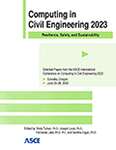Selection of Optimal Phase Change Material (PCM) Properties Based on Different Climates to Reduce Energy Consumption in Buildings
Publication: Computing in Civil Engineering 2023
ABSTRACT
This study aims to provide material scientists and building designers with valuable insights regarding the properties of shape-stabilized phase change material (SSPCM)-cement composites to maximize building energy efficiency. To this end, the energy-saving potential of SSPCM composites is evaluated using the Department of Energy’s (DOE) reference commercial building for small office buildings, and energy simulations are conducted through EnergyPlus. A parametric study is conducted to investigate the impact of peak melting and solidification temperatures on the heating, cooling, and total heating; ventilation; and air conditioning (HVAC) energy consumption in two representative cities, Houston and Chicago. The results indicate that the optimal peak melting temperature and optimal solidification temperature in hot climates are higher than those in cold climates. Furthermore, the study reveals that heating dominant climates exhibit a higher sensitivity to the choice of peak melting temperature, while cooling dominant climates are more sensitive to peak solidification temperature. These findings have significant implications for building designers interested in maximizing energy efficiency. Specifically, the selection of peak melting temperature is crucial in cooling dominant climates, while the selection of peak solidification temperature is more critical in heating dominant climates. Overall, this study emphasizes the importance of considering regional climatic conditions when developing and implementing SSPCM composites in buildings for optimal energy performance.
Get full access to this article
View all available purchase options and get full access to this chapter.
REFERENCES
Abbass, K., Qasim, M. Z., Song, H., Murshed, M., Mahmood, H., and Younis, I. (2022). A review of the global climate change impacts, adaptation, and sustainable mitigation measures. Environmental Science and Pollution Research, 29(28), 42539–42559. https://doi.org/10.1007/s11356-022-19718-6.
Commercial Reference Buildings. (n.d.). Energy.Gov. Retrieved June 13, 2022, from https://www.energy.gov/eere/buildings/commercial-reference-buildings.
EnergyPlus. (n.d.). Retrieved June 23, 2022, from https://energyplus.net/weather-region/north_and_central_america_wmo_region_4/USA.
Hagenau, M., and Jradi, M. (2020). Dynamic modeling and performance evaluation of building envelope enhanced with phase change material under Danish conditions. Journal of Energy Storage, 30, 101536. https://doi.org/10.1016/j.est.2020.101536.
Jeon, I. K., Azzam, A., Al Jebaei, H., Kim, Y.-R., Aryal, A., and Baltazar, J.-C. (2023). Effects of shape-stabilized phase change materials in cementitious composites on thermal-mechanical properties and economic benefits. Applied Thermal Engineering, 219, 119444. https://doi.org/10.1016/j.applthermaleng.2022.119444.
Jeong, S.-G., Wi, S., Chang, S. J., Lee, J., and Kim, S. (2019). An experimental study on applying organic PCMs to gypsum-cement board for improving thermal performance of buildings in different climates. Energy and Buildings, 190, 183–194. https://doi.org/10.1016/j.enbuild.2019.02.037.
Mohseni, E., and Tang, W. (2021). Parametric analysis and optimisation of energy efficiency of a lightweight building integrated with different configurations and types of PCM. Renewable Energy, 168, 865–877. https://doi.org/10.1016/j.renene.2020.12.112.
Saffari, M., de Gracia, A., Fernández, C., and Cabeza, L. F. (2017). Simulation-based optimization of PCM melting temperature to improve the energy performance in buildings. Applied Energy, 202, 420–434. https://doi.org/10.1016/j.apenergy.2017.05.107.
Wi, S., Chang, S. J., and Kim, S. (2020). Improvement of thermal inertia effect in buildings using shape stabilized PCM wallboard based on the enthalpy-temperature function. Sustainable Cities and Society, 56, 102067. https://doi.org/10.1016/j.scs.2020.102067.
Information & Authors
Information
Published In
History
Published online: Jan 25, 2024
ASCE Technical Topics:
- Architectural engineering
- Building design
- Building systems
- Climates
- Composite materials
- Construction materials
- Design (by type)
- Engineering fundamentals
- Engineering materials (by type)
- Environmental engineering
- HVAC
- Material mechanics
- Material properties
- Materials engineering
- Measurement (by type)
- Solidification
- Temperature effects
- Temperature measurement
- Waste management
- Waste treatment
Authors
Metrics & Citations
Metrics
Citations
Download citation
If you have the appropriate software installed, you can download article citation data to the citation manager of your choice. Simply select your manager software from the list below and click Download.
